Column by Mahfuz Anam: No govt has ever fallen for being self-critical
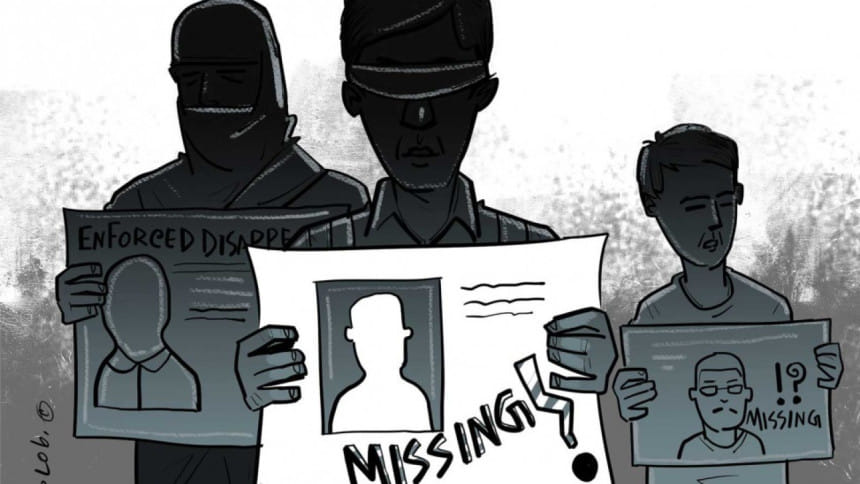
UN High Commissioner for Human Rights Michelle Bachelet has left us a "laundry list" of things to do. Generally, when we are advised to do things – out of courtesy, I am avoiding the term "lectured" – following the visit of a dignitary, it does not leave a good taste in the mouth. No one can feel good about getting an earful from a visitor, howsoever well-intentioned. This feeling verges on outrage when we see traces of duplicity as to how these "to-do" lists become long or short, harsh or mild, direct or nuanced depending on the country they are addressed to. Would such a list, on similar issues, be given to global or regional powers? Would China, Germany, France, Spain or India be similarly spoken to?
If we want to stop being lectured by international bodies, then we as a people, and much more so our government, must listen to our own critical voices. Our government must allow – not as a favour, but as a part of our right – others to speak. It must be open to alternative suggestions, dissenting observations, and even forceful rejections by national experts, stakeholders and the media. Terming every critic as a "conspirator" does not help in opening channels for vital feedback.
There is no human rights violation, there is no extrajudicial killing, there are no custodial deaths, no enforced disappearances, no violation of the law – such narratives do not serve any purpose. By denying the facts, we create grounds for foreign "lecturing" and open ourselves to external pressures. Can it be denied that deaths in the hands of Rab have practically stopped after the US sanctions? People, families and the media have been clamouring for years about extrajudicial killings. There have been hundreds of demonstrations, protests by forming human chains, press briefings and petitions against enforced disappearances and extrajudicial killings in Bangladesh, and nothing happened. And like magic, it suddenly stopped – even if temporarily – when certain restrictions were imposed by outside powers. So what will the people conclude? That we and our protests don't matter. Only when international pressure comes upon our government may we see some results.
Literally everything the UN human rights chief said, we – human rights activists, civil society and the media – have said before, and for years. We have written volumes on them and have published thousands of editorials and op-eds on these very subjects. None of them have been taken seriously. In fact, the most powerful and insightful of them have been disdainfully brushed aside as coming from habitual critics who cannot "tolerate the government's unprecedented success."
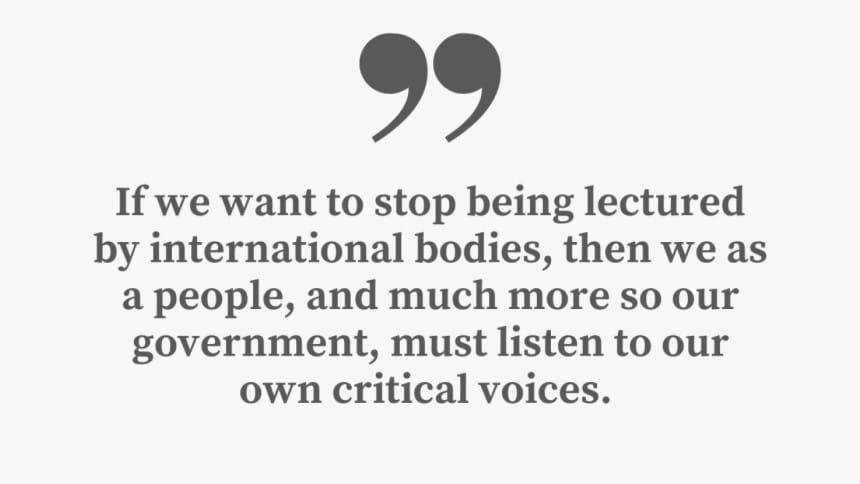
Of all Michelle Bachelet's suggestions, the one we would like to see our government take up seriously is to set up an independent, specialised mechanism to probe extrajudicial killings. Implementing this one suggestion would bring about many changes, especially the setup of an accountability mechanism – something that has gone missing from every part of our government.
Among others, the thing that clouds Sheikh Hasina's many achievements is the lack of accountability. As the head of the government and repository of all powers (our constitution provides for a very powerful executive head), it is expected that she would be subjected to the most stringent of accountability. (We saw how Boris Johnson, the former UK prime minister, was held accountable both by the parliament and, more importantly, by his own party). But that is not our reality. Not only that we cannot have it, even to expect it is sacrilegious. However, if the prime minister really wants to have an effective administration, what she needs the most is accountability in every sphere of her government: administration, law enforcement, dispensation of justice, banking, health services, education, etc. Lack of accountability can be said to have devastated this government, and is mostly responsible for our chaotic response to the present economic crisis.
The government will need to invest a lot of money to overcome the present economic crisis. It has to heavily subsidise the essentials for the poor and the lower middle class. Where will it get the money from? While we approach the global lenders, we also need to hold ourselves accountable as to how we spent our hard-earned resources over the last decade. Paying thousands of crores of taka as "capacity charges" to a few companies, that also for years and in US dollars – which started for three or four and is now continuing for 13 years – is just one example of where the lack of accountability can lead to. It may have been necessary for a specific period and in a far smaller scale, but never for the amount and for that long a period.
Coming back to the UN human rights chief's suggestion, we believe such a body will bring accountability in our law enforcement agencies. Extrajudicial killings along with enforced disappearances are the two most dreaded of a plethora of consequences that our people suffer from because of our allowing the police, Rab, intelligence agencies and surveillance bodies to run amuck. The poor, the day labourers, low-income people and those who have small businesses are mostly the victims of abuse of their power, one of whose effective methods of oppression is implicating people in false cases and then charging money to exonerate them.
To want to tell one's own story is natural. To think that such a story is very important is understandable. But to think that that is the only story is dangerous. We are now in that dangerous zone. The stories that our ministers told the UN high commissioner for human rights were so far from the truth, so removed from reality and in such contrast to the daily experience that they ended up insulting the families who lost their near and dear ones and reinforcing the impression of the international "human rights" community that the facts given out by our government cannot be trusted.
We must move away from the culture of denial and develop the confidence of being self-critical. No government in the world has ever fallen for being self-critical. On the contrary, it fell from power for being self-enamoured. That happens because the most dangerous aspect of the culture of denial is that what is meant to mislead others ends up misleading themselves, which destroys their own connection with reality.
Mahfuz Anam is the editor and publisher of The Daily Star.

 For all latest news, follow The Daily Star's Google News channel.
For all latest news, follow The Daily Star's Google News channel. 



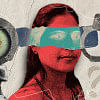
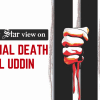
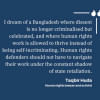



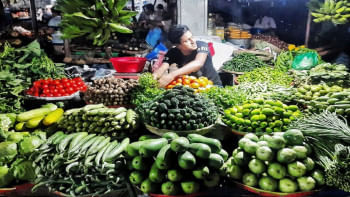
Comments